Professionalism in Teaching
Although I often wear many hats at EPS, (advisor, accompanist, teacher, and music director) when things get busy, I try to prioritize the students’ in-class experience above the rest. I believe that a well-planned and executed 70-minute class period can lead to the best skills growth & musical artistry, and deeper social connections, and teaching music is ultimately what I am most passionate and excited about as an experienced musician and educator.
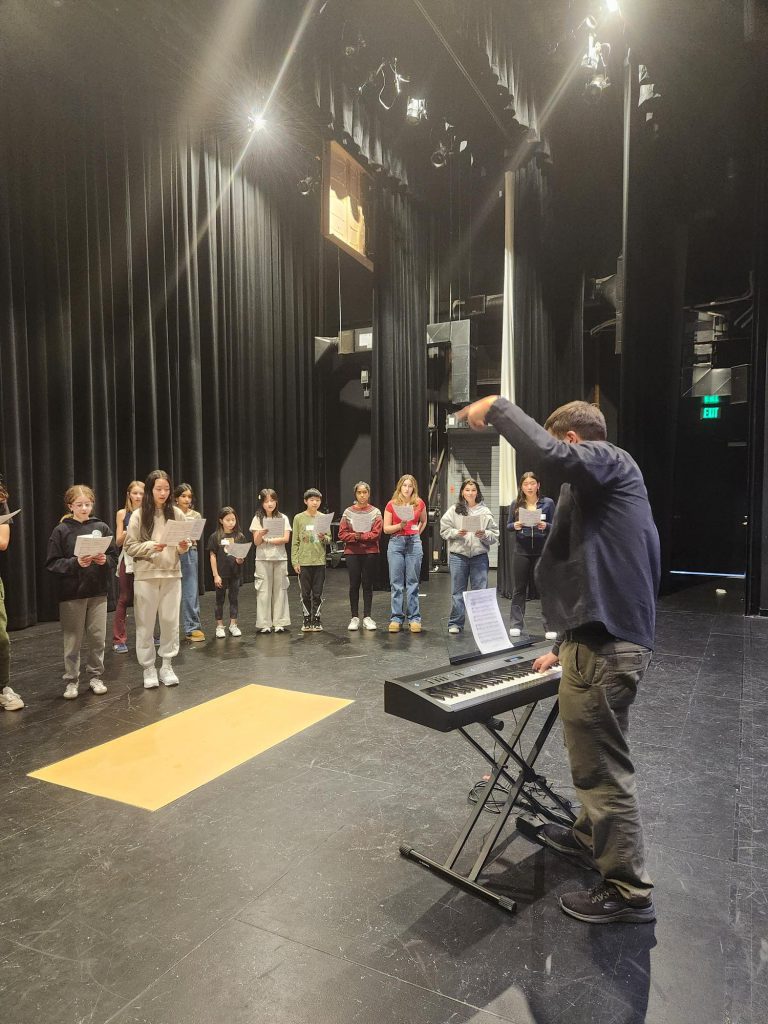
There are certain times of the school year where I feel the strain of management and prioritization most acutely at EPS- particularly the end of winter term when the musical begins, and also the two weeks leading up to the musical production. Although it is taxing to take on a giant project right before winter finals week, (auditions and show music editing) I can always lean on my music team to help support me in staying organized and positive through that time. During the weeks leading up to the production when rehearsals get lengthier, the show demands quite a bit of sacrifice from other parts of my life and the workload can often feel unsustainable, so as I reflect upon this school year, I realize that a future priority will have to be creating stronger boundaries around the demands of that position, if I take on that responsibility again.
Some of my strengths when it comes to management and prioritization include my usage of canvas as a tool for quizzes, assignments, participation tracking, and condensing all of the materials we need in music classes into one place. I also feel strong in my ability to keep an organized and tidy classroom throughout all the different types of classes/clubs/advisories that use the space. Students can always count on a detailed agenda of how we’ll use our class time on the board before each class.
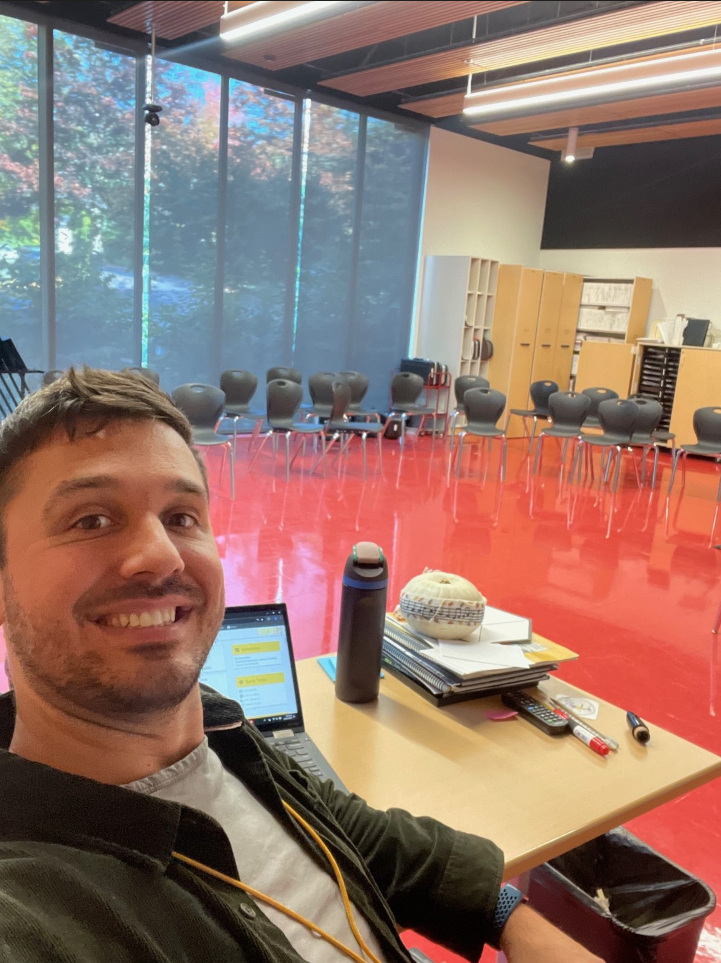
I believe that communication, especially in-person verbal communication, is one of my great strengths, and is probably one of the reasons I became a teacher and enjoy the career. I feel like I can sense quite a bit of context and emotion from anything a student says, and can find a way to uplift and validate the feeling behind the statement, while keeping the student aware of the community of students around them, trying to either re-direct behavior or words, sometimes trying to instigate or retain excitement about the topic, and encouraging a student to get interested and dive deeper into topics on their own.
I make a point to answer all emails once per day, regularly communicating with fellow faculty, parents and students. I like to take time to make sure I’m being thoughtful about my writing and choosing the exact right words to express what I need to express before sending an email, so the constant, all-day-long sending/receiving messages that I notice from some of my colleagues is not my style, as I need time to fully focus on planning, instructing, preparing class materials, preparing for advisory, etc. The curriculum in music classes is constantly changing; we never just repeat the same music, so there is lots of listening and searching for music in a variety of places, and lots of trips to the copy machine in my typical day.
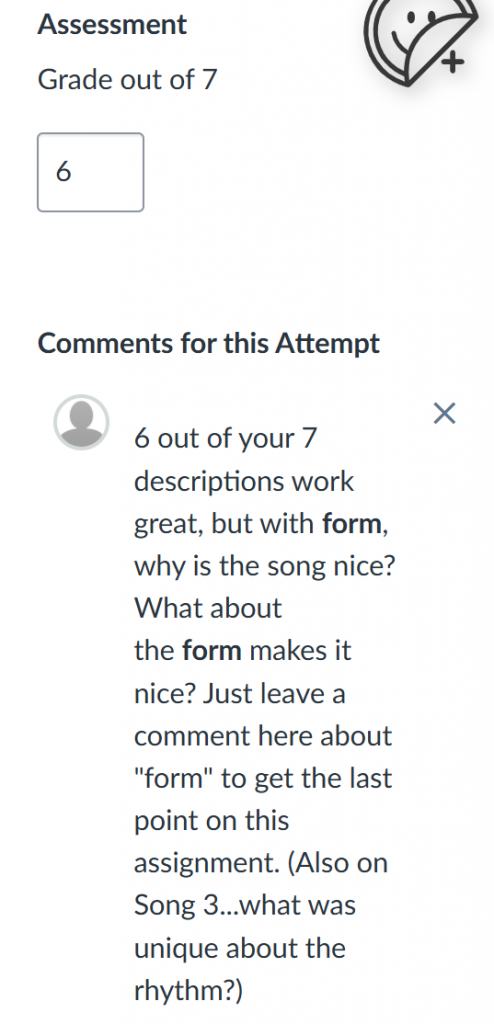
On imperfect assignment submissions, I always utilize the comments on Canvas to clearly articulate exactly what students misunderstood or need to do moving forward. (Often there is a rubric posted that I can point to.) I also occasionally post “announcements” to a class in canvas, in addition to sending a class-wide email when anything pertains to a performance or event. (Concert clothing requirements, when music is to be memorized, etc etc)
Often music classes that are rehearsing music tend to draw in visitors, as the sounds travel throughout the school and sometimes fellow teachers/administrators/students feel strongly about certain songs! The pace of an ensemble rehearsal tends to be very fast-paced once students are familiar with a piece of music, with constant formative assessment and changes/tweaks being made throughout the class, so it can be informative and entertaining for others to watch.
Inviting in guests is also a foundational part of the Intro level music classes; we share a short presentation of music with families/parents on teams toward the end of the trimester, and often teachers/students who have a free period will come watch and listen as well.
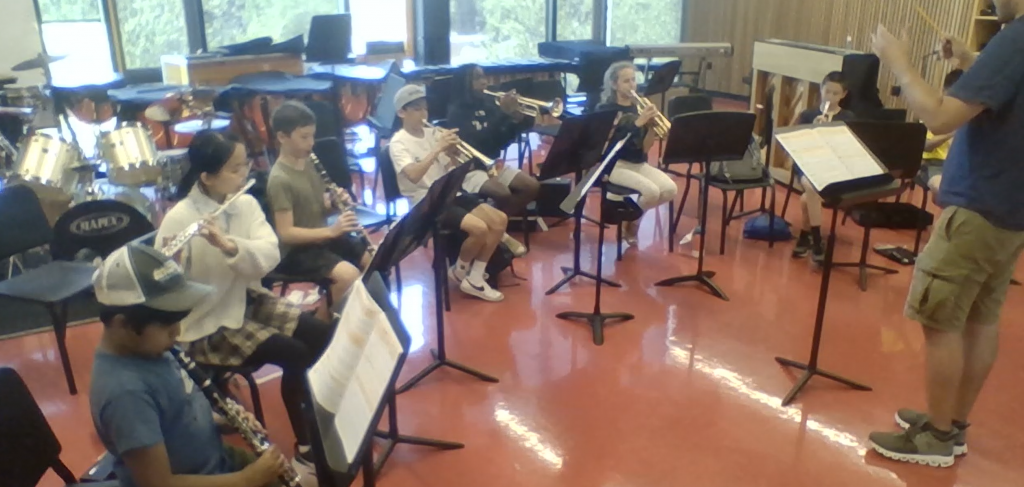
In the fine & performing arts world here at EPS, we share limited spaces like the instrumental music room, the choir room, and the theater, so we are regularly visiting each others’ classes and offering some outside perspectives. This is one of the things I enjoy most about my position here; my wonderful arts colleagues and how much we support each other.
In doing this PDP process, it’s also been nice to have the perspectives of others from the English and Math disciplines, who share their insights into how some of these skills they’re observing me teach are similar to things they teach.
Feedback on Teaching Style
Although it can sometimes feel vulnerable, changing practice and trying new approaches to teaching can lead to big breakthroughs and better outcomes for students. This PDP process is a great example of me sharing the processes and procedures (and my reasoning behind them) that I’ve arrived at after eleven years of teaching. I am excited to get feedback and ideas from my team for future projects/changes that could be made.
When thinking about changes to be made to my practice, I think first about grading, because in my mind, everything about the class experience is affected by what I state is important to the students and what is graded. I actually get excited thinking about different systems of grading that might be more applicable to the arts…for example when I taught at a large public high school in the past, they were in the process of moving to a standards-based grading system, which theoretically made much more sense to me in the arts, as it mirrors the process of how a musician refines and works on music for a performance. The idea that a student has a series of skills they are building, and starts the term with a “zero” in various categories and gradually works UP toward the grade they want by the end of a term, showing the teacher those skills in various categories makes much more sense to me than a student having an “A” on the first day, after turning in one assignment and getting a 5/5. I would love to continue experimenting with changes to my grading practices, and getting feedback from other arts teachers about those changes.
In terms of my in-class presence and teaching style, the feedback I have heard most from others is that I have room to be a little more firm and direct with students who aren’t behaving as expected. I think that sometimes my re-direction and comments about behavior can be perceived by teenagers as suggestions, and don’t accurately convey the sharp, abrupt change that a student may need at times. This can then lead to those students who’ve remained fully engaged becoming annoyed when small disruptions are being allowed. Moving forward my goal when corrections are needed is working on a “firm but gentle” tone that gets what I need.
One of my challenges that I perceive about my teaching style is that I tend to get a little long-winded about music-related topics I care a lot about…I need to keep in mind that the attention span of fifth and sixth-graders is short, and having ample games/movement/rhythm activities in each 70-minute period is key. I have noticed that I tend to connect very well with the 7th and 8th graders; somehow their strangeness seems to nicely match up with mine, and we generally form strong bonds. I love the earnestness, seriousness, and advanced thinking of upper schoolers, however, getting regular responses, enthusiasm, goofiness and smiles from them can sometimes be a challenge. My general philosophy for instigating outgoing, playful and team-building behavior is that if I am comfortable being the biggest clown in the room, it allows space for the slightly more outgoing students to be comfortable being the “second-biggest clowns”, which then makes everyone feel comfortable mingling, trying new things, and breaking down social barriers.
Professional Development
I make an effort during PDD’s to sit with varied groups of faculty, and to get lots of perspectives throughout all the sessions. I especially appreciate the social events and activities, as they are often some of the only times throughout the year that allows time to get to know fellow faculty on a personal level. Meeting with fellow Fine and Performing Arts team members during Professional Development days helps give me direction for the trimester, as we talk about possible themes for music concerts, possible shows to produce for the upcoming school year, and discuss possible course offerings or programmatic changes we might make in the future, so I’m always uplifted by the F&PA team.
I appreciate the humor, wit, levity, and occasional sarcasm that fellow faculty members feel comfortable sharing during meetings, and it makes me feel like a part of a close-knit team, and I feel very free to offer opinions and share during the sessions.
I have done some project tuning work with a few other faculty during the EVO of Instruction sessions to plan a session to teach faculty to use the student mastery gradebook, and how to link outcomes to that. (This would help mimic some standards-based grading practices using our current points-based system.) I have yet to present this, but I’d like to at some point once I feel more comfortable actually using this system with my own classes.
Last school year when Chamber Choir performed with other regional choirs at Benaroya Hall, I got the opportunity to conduct the mass choir when one of the clinicians was running late, and it felt great to conduct some warm-ups and to hear the sound of 200-ish students all singing together.
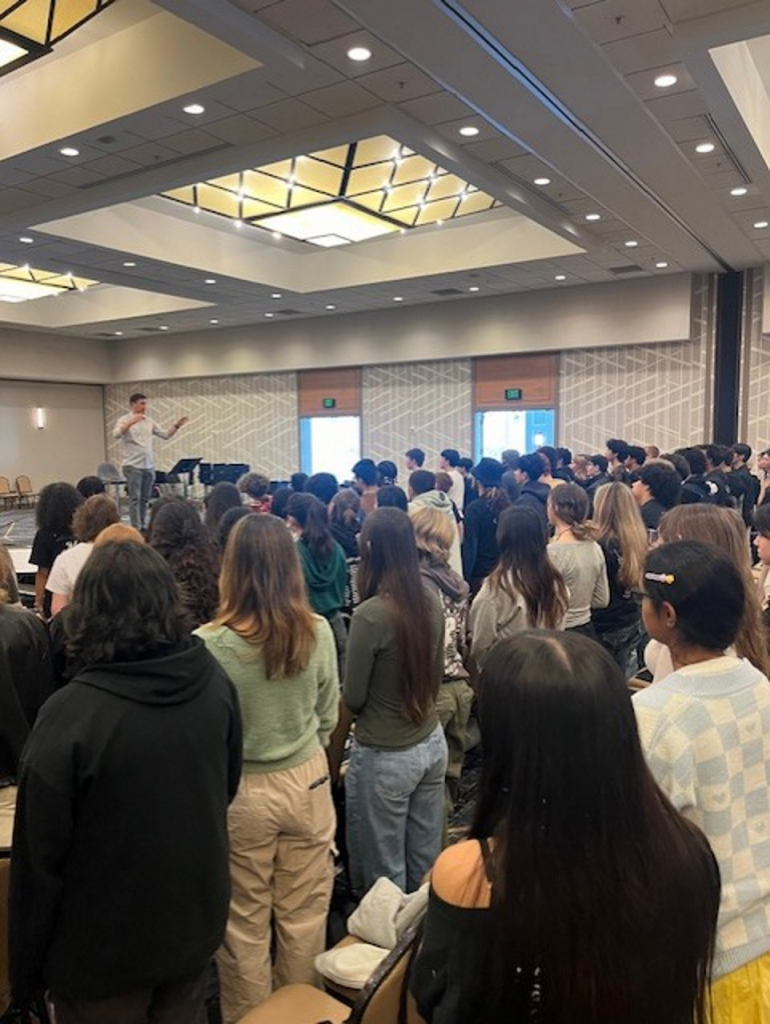
I often seek out and use a variety of online resources to connect with the wider music teaching world, like ChoralNet (a resource from the American Choral Directors’ Association) to troubleshoot choir issues/topics and as a starting place to find repertoire, sight-reading factory and MusicTheory.net as a source for group exercises/warm-ups, and Choral Clarity as a resource for helping students that struggle to match basic pitch. Ginger, Ed and I often send each other teaching topics/help for digital music and rock music classes using sites like teach Rock, shedthemusic, and soundtrap.
In the past, I’ve been very active in the American Choral Directors Association, going to the national and regional conventions, collecting repertoire ideas, learning new teaching techniques, and hearing choirs from around the country, but since my role at EPS is so much broader than just teaching choir, the kind of professional development I need has expanded as well. Now I need to learn basic skills on a wide variety of instruments, digital music platforms, develop a repertoire of advisory games and activities, and create audio tracks that students can record their vocals along with. The best way to gain these skills is by learning from fellow colleagues within EPS and finding time to practice the things I’m new to. So at this point, after four years at EPS, I’ve been able to develop professionally here at school, but moving forward, I’d love to find some more moments in the school year to attend outside music educator events.
For instrumental music, my professional development mostly includes learning repairs and maintenance tips and tricks from Ed Castro, and learning to play some of the wind instruments I teach (you should hear my attempt at playing trumpet…it’s gotten better recently, in that I have around a 2-octave range now, but yikes. It is not beautiful.) I have a goal of acquiring my own flute and learning that instrument also, in order to better help young flute students I teach. Having learned the alto saxophone as a middle schooler myself, I feel fairly comfortable teaching clarinet students, as it’s pretty similar. The trombone is another goal of mine to learn. I feel very comfortable with string instruments, having played the violin for years, and having a family that grew up in a large string instrument program. (Cello-playing sister, viola-playing brother.)
Overall, I would love to set a goal of attending more conferences and events outside of the EPS world, such as the ACDA regional conference or the NAfME (National Association for Music Educators) state conference, and to continue learning to play the wind instruments that I occasionally teach.